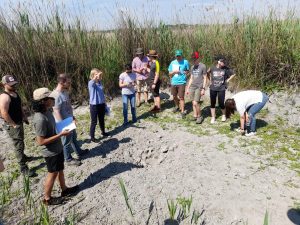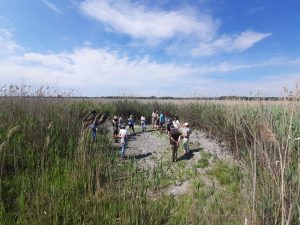The regular annual hydrogeological field exercise was held between June 7-10, 2022, the purpose of which is for students to learn about established hydrogeological field methods, to perform measurements, and to be able to answer complex hydrogeological questions through field data collection. In addition to the Hungarian geology students, Stipendium Hungaricum students studying at ELTE and a postdoctoral student (Morocco-Mexico) joined the practice. The instructors included the hydrogeologists (Szilvia Szkolnikovics-Simon, Imre Müller, Ábel Markó, Judit Mádl-Szőnyi) as well as Márk Szijártó and Ferenc Visnovitz from the Department of Geophysics. Soma Oláh, undergraduate student in Earth Sciences also took part in the exercise as a research assistant of the Chair who was responsible for the sampling of the experimental equipment.
The first part of the field exercise took place in the vicinity of Jászszentlászló and Kerekegyháza. In addition to visiting the lakes and their surroundings, the students participated in field well surveys and well sampling. After the field survey, laboratory measurements will be carried out and based on the data, the water flow directions and the connection between the lakes and the groundwater will be learned by editing maps and sections. The exercise was preceded with research on the issue of water retention in drying lakes based on a cooperation between the Chair and the WWF Hungary.
Further detection of the monitoring wells created in the area and the processing of the data will be continued in an MSc thesis as part of the National Multidisciplinary Laboratory of Climate Change RRF-2.3.1-21-2021 project “The impact of climate change on the “invisible” subsurface part of the water cycle, direct and indirect ecological consequences and “adaptation” sub-project.

The other location was Kerekegyháza and its surroundings, which is also located in the area of the Danube-Tisza Interfluve that affected with a significant water level drop and water shortage. Here, the students visited the experimental station for rainwater collection and re-injection, which was established in January 2020 by the Chair’s researchers and has been operating since then. It was set up in order to detect changes in water quality and water level caused by re-injection. The research on this topic, the connection of the possibilities of rainwater re-injection and subsurface heat storage will also be continued in the future as a TDK research within the framework of the RRF National Laboratory project.
The students were introduced to geophysical methods. Measurements were made and shallow drillings were established in the surroundings of the settlement, the purpose of which was to identify the shallow geological and hydrostratigraphic structure and the potential near-surface aquifers.
At the same time, the students received inspiration for TDK and MSc thesis research topics and for joining the RRF project.
BÁCSVÍZ Ltd. employee Endre Csiszár, who is an active participant in the ELTE cooperation with the company, was present throughout the exercise. In addition, we received support from the Municipality of Kerekegyháza by securing the location of the field measurements.



